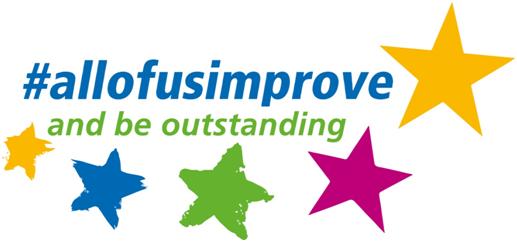Learn more about #allofusimprove
We are working with staff across our Trust to bring you a new series of case studies focusing on how we are making improvements to:
• Patient safety
• Patient experience
• Operational excellence 
With a huge range of improvement work going on in our Trust, our case studies will focus on a range of improvement projects. In the series, we’ll hear from Trust staff who’ve been involved in improvement work, overcoming barriers and making a real difference.
The examples shared will also offer tips, aiming to inspire professionals both in our Trust and in the wider NHS.
We’ll also share them via our internal communications products (like The View and The Headlines) and also across social media, using the hashtag #allofusimprove
Case study 26: A fall in falls
Case study 25: Kirklees learning disabilities team help people to be seen more quickly
Find out how the team reviewed their caseload to improve service user experience and provide more timely interventions.
Case study 24: Digital developments at the recovery college
When the Covid-19 pandemic began face to face meetings were restricted. Read how the Recovery College adapted to a virtual world.
Case study 23: Paediatric epilepsy nursing service – embracing long-awaited change
After wanting to do virtual appointments for nearly 10 years, find out how the team finally embraced virtual platforms when the Covid-19 pandemic forced services online.
Case study 22: Perinatal goes virtual – balancing remote and office working
Read how the perinatal team and service users have benefitted from virtual appointments.
Case study 21: Tomorrow’s world…yesterday
Read how the CAMHS teams adapted to working digitally throughout the COVID-19 pandemic.
Case study 20: Stability and innovation key to MSK success
Case study 19: Improving discharge letters to reflect our Trust values
Case study 18: Providing lifesaving COVID-19 vaccinations to staff at the Trust
Coronavirus (COVID-19) staff vaccinations began on 12 January 2021 at the Trust. Read how we used data and insight to provide tailored support and communications to staff, to help listen to any concerns or feedback and remove barriers.
Case study 17: Early intervention in psychosis – North Kirklees Insight team
Team leader, Szilvia Kormondi, explains how the team achieved the National Clinical Audit of Psychosis (NCAP) standard and were rated as ‘Top performing’ – with only 11 teams (7%) in the whole country receiving this rating.
Case study 16: Medicine omissions safety cross
Deputy ward manager Laura Ramsey explains how Stanley ward in Wakefield have been working to manage medicine omissions with the help of a handy chart.
Case study 15: Child sexual exploitation strategy
The Trust leads for safeguarding explain how we’re encouraging our staff to be ‘professionally curious’ when it comes to spotting the signs of child sexual exploitation through the introduction of a new strategy.
Case study 14: Agile working
Julie Bassendale, community matron with the Barnsley neighbourhood nursing service, explains how adopting an agile way of working enables her to be more responsive,
efficient and effective.
Case study 13: Text message reminders
Mike Garnham, health intelligence analyst / information manager, explains how simple text messages are helping to bring down the rate of missed appointments.
Case study 12: Training and education co-ordinator
Natalie McCarthy explains how her newly-formed role as training and education co-ordinator with the Barnsley neighbourhood nursing service is helping care homes to improve the service they provide.
Case study 11: Tuberculosis (TB) pathway
Team leader and lead Tuberculosis nurse Beverley Jones explains how the team streamlined the treatment pathway so that asylum seekers and EU migrants with a TB diagnosis could get help quicker.
Case study 10: Bags of dignity
Assistant director Julie Eskins explains how we’re helping to maintain a patient’s dignity and to respect the feelings of families and carers by purchasing number of new bags which can be used to return personal belongings following unexpected deaths.
Case study 9: Vital work to extend lives in the heart failure specialist nursing service
Mandy Houghton and Jane Jukes explain how the heart failure specialist nursing service in Barnsley has recently adopted innovative new approaches to help meet increasing demand.
Case study 8: Reducing medication missed on inpatient wards
Kate Dewhirst, interim chief pharmacist, and medication safety officer, tells us how we have improved how we dispense and administer medication on inpatient wards by reducing the number of medications that are missed.
Case study 7: Improving the quality of life in pulmonary and cardiac rehabilitation services
Jill Young, clinical team leader, explains how both the pulmonary and cardiac rehabilitation services in Barnsley have made changes to increase the number of people accessing both services.
Case study 6: Internet access for forensic service users
Claire Girvan, occupational therapy team leader, explains how making the internet available to service users in our forensic settings has driven improvements for service users and staff.
Case study 5: Occupational health support for serious incidents
Occupational health senior staff councillor Paula Fawcett tells us about the support they are providing to staff who are involved in incidents. This helps staff through difficult times and makes sure we have the right wellbeing support for all of us.
Case study 4: Checklist for autism-friendly environments
Our lead autism practitioner Stephen Simpson tells us about the checklist for autism-friendly environments that makes our spaces friendlier for people with the condition.
Case study 3: Out of area beds in Wakefield acute services
General manager James Waplington tells us how we’re taking a new approach to care to keep people in their local communities, promoting quicker recovery and reducing unnecessary costs.
Case study 2: Forensic visitor survey
Quality improvement and assurance lead Liam Redican explains how gathering people’s views in a new way is helping our forensic service to put families and carers first.
Case study 1: Safety huddles
In our first case study, patient safety manager Helen Roberts tells us how a quick team meeting is making a huge difference to the safety of our wards.
Page last updated on: